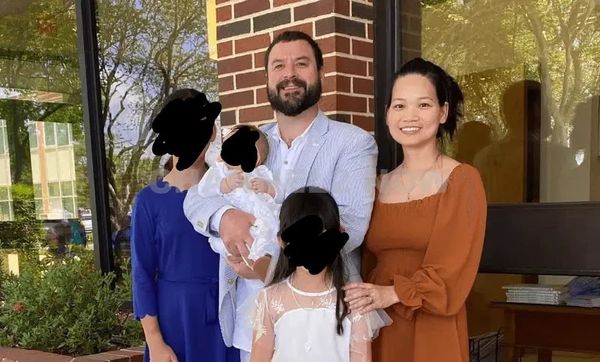
Every so often you come across an artist you just know is going to make it as a star. Whether it’s their confidence, their talent, their pedigree, their determination, their backing or some combination of all of those, they have a can’t miss vibe about them.
Dorothy Martin, lead singer of L.A. band Dorothy, is one of those rare talents. Sure, that might seem obvious, with her rock star charisma, her incredible voice and her timeless vibe, but a lot of artists that appear to have the total package don’t succeed.
Martin, however, has that air. Part of it is her attitude. When we meet backstage at Arroyo Seco, where she is playing the same day as Robert Plant and Alanis Morissette, among others, she seems totally unphased by the weight of the situation. However, there is no arrogance in her calm. She is humble, open about her sobriety and very much comfortable in her skin.
Dorothy’s 28 Days In The Valley is one of the best albums of the first half of the year, a package that has earned her comparisons to Grace Slick, among others. But just as her recent tour mates, Greta Van Fleet have been tirelessly compared to Led Zeppelin unfairly, Dorothy’s influence is so much more than one artist. It is blues, country (she just did a track with Dolly Parton), the fierce “Who Do You Love” has a bit of Nick Cave in it. All of it comes together in a rock collection that is powerful and irresistible.
I spoke with Dorothy about her influences, from Parton and Steven Tyler to Beyonce, about winning over new fans, who keeps her grounded and why listening to Joan Baez can lead to a good cry for her.
Steve Baltin: Did you know much about Arroyo Seco coming in?
Dorothy Martin: No, it was like, “You’re playing.” Then I saw the lineup and I was like, “Wow.” This is my first time even hearing about the festival and I’m just really happy to be here. We just got off tour with Greta Van Fleet.
Baltin: When you see a gig like this on the schedule and you see who is playing do you get more pumped for it?
Martin: Oh yeah, the lineup is everything. I’m always looking to artists that I love. I couldn’t make it yesterday for Neil Young and Jack White, big fan so that was sort of a bummer, but we are playing Lollapalooza. Me and Greta are doing the official after party at Vic Theater. Chicago has been some of our best energetic shows, the fans, their energy.
Baltin: Are you one of those artists that relishes the challenge of coming and playing for new audiences?
Martin: Yeah. I feel like we have a pretty good success rate and by about the third or fourth song they’re like, “Okay.” Then by the end they’re like, “Oh yeah, and that’s always a good feeling.
Baltin: Is there one song you notice they really respond to?
Martin: What’s funny is this particular record we’ve put out everyone has a different favorite song, which, to me, says it’s pretty well rounded and there’s something for everyone.
Baltin: Songs change and take on different meanings. Are there songs off 28 Days In The Valley that are evolving for you?
Martin: “Mountain” is actually a song about myself speaking to myself as another person. And I had a fan ask me, “Is that a gay love song?” I was like, “No, but I can see how that was your interpretation and that’s very beautiful because it’s about wanting to love someone.” But I say she, so that’s how my fan interpreted it.
Baltin: As a writer what did you learn from “Mountain” about what you needed to do to take care of yourself?
Martin: I didn’t even know the song was about me. Sometimes I write so subconsciously that I’ll go back later and be, “Oh dang, that’s what that song is about.” So they do surprise you and your perception of them might evolve.
Baltin: As a fan what are the songs that have really evolved and changed for you over time?
Martin: “I Will Always Love You,” by Dolly Parton. I just did a song with her. I did a song for the soundtrack of the movie Dumplin’, which was produced by Jennifer Aniston and the music was produced by my manager, Linda Perry. We went in the studio together and I was so nervous. She’s like, “You got a good voice, maybe if we get along we can make an album together.” I just love her personality.
Baltin: As an artist what are those moments you know you’ve made it? And it can be working with Dolly or having an audience sing your songs back to you?
Martin: We’ll play stuff like this and they will recognize my music and that’s always a really good feeling. I don’t know where I’m at, I can’t say I made it. I’m just grateful for every opportunity that I’ve gotten to this point. I look at it like a journey, what’s gonna happen next? I try not to get too caught up in the BS of the music industry and fame.
Baltin: One thing I have found though and I am sure you saw this with Dolly, the more successful someone is the nicer they are because they have nothing to lose.
Martin: Slash I met, as well, very humble and he was like, “I love your music.” I was like, “Wow, really?” That was huge. And he asked us to play a show with Myles Kennedy for New Years a couple of years ago in Vegas, that was really nice. Dolly is obviously another one. I’ve rarely met people who have been entitled or arrogant. There have been a couple, but I won’t name them. I’m pretty good at picking up vibes. I can tell right away, I feel the energy. But we’re all human and we all have good days and bad days and there are days where I’m a total dick and I make the effort to make amends and set it right.
Baltin: Who are the people you trust to help keep you grounded or call you out on those bad days?
Martin: I have a wonderful, supportive band and team and management. I’m also in a 12-step recovery program, that keeps me pretty humble. Especially when I’ve experienced where that can take me. I speak about it pretty openly. It’s a humbling situation to have to live with, so it helps me stay humble.
Baltin: How much do you learn that humility from watching what’s happened in the music industry?
Martin: There’s MAP and MusiCares, who helped me out. In fact I want to do something to give back to them. I empathize with how they must feel because they’re in so much pain. To take your own life is they’re probably tired of fighting. It gets me a little emotional.
Baltin: I don’t want to get you too emotional before you play.
Martin: It’s alright, it might be the best set ever. It’s a good release too.
Baltin: For you, who is the one artist you’ve seen that channels that emotion best into a set?
Martin: Beyonce, on the first “On The Run” tour with Jay-Z, put on the most incredible performance I’ve ever seen. And her message for women brought me to tears, it was all about empowerment. That was a very, very empowering message for me. I didn’t get to go to too many shows as a kid, so I’m trying to make up for it now. Jack White played Coachella, that was incredible.
Baltin: Who’s number one then to see?
Martin: The Rolling Stones, I would love to see them. I’ve seen Aerosmith, they were great. I look up to Steven [Tyler] a lot as an artist and an influence. I feel we have a lot in common.
Baltin: What one song would you want to do with the Stones?
Martin: I might want to just do the classic old blues cover, like Leadbelly.
Baltin: What do you hope people take from it when they hear 28 Days In The Valley and what do you want those fans seeing you today for the first time to take away?
Martin: I want them to feel the passion and energy of the band. You can tell right away when someone grabs you and makes you feel it, the music makes you feel. That’s what I want them to experience here and listening to the record I want them to go on a road trip and feel free.
Baltin: What was the last song that grabbed you and made you feel?
Martin: I was on the tour bus listening to Joan Baez “Diamonds And Rust.” My dad used to play it for me and I just collapsed into tears. It was such a good thing, I needed to cry and her voice is so beautiful.







